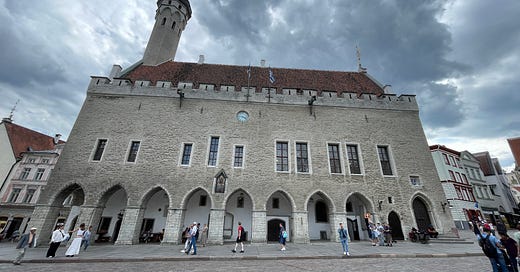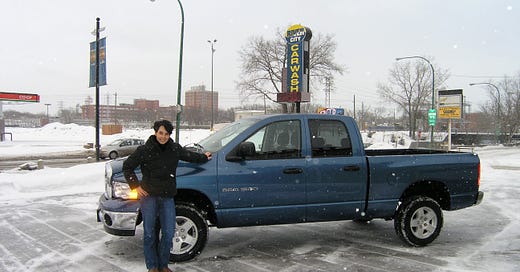

Discover more from The Grizzly Bear Diaries
It took several visits to Ukraine and dozens of interviews – some in person and some on scratchy phone lines. Then there was nearly a year of waiting for the Canadian consular service to issue visas.
But finally, last month, six Ukrainians – three injured soldiers, two frontline combat medics and one veterans organiser - arrived in Calgary, eyes bleary from a trip that had taken them halfway around the world.
As we sped through the Canadian Rocky Mountains towards the lodge, eight hours to the south-west, most of them slept.
But Oleksandr, a 28-year old who had lost both legs to a Russian artillery strike early in the war, whistled softly and snapped photos of the rock and snow towering above us on what is surely one of the loveliest roads in the world.
And in that moment, surrounded by the shell-shocked, the battered and the scarred from the battle plains of eastern Europe, all the planning, logistics, fund-raising and delays, were suddenly worthwhile.
The seed of the idea that flowered into our Wild Bear Vets 2024 programme lay back in pre-Covid times.
Our quiet remote valley teaming with fast-flowing creeks and iconic megafauna had helped salve my mental scars after a decade and a half reporting on the world’s frontlines. Perhaps it could help others too, I mused.
In Sept 2021 the first group of wounded veterans - three Brits and two Canadians – arrived at the lodge.
The aim was twofold. Firstly to let nature work its magic. But, in line with the notion that giving is as good for the soul as receiving, we asked that the veterans also share with us skills that were relevant to our world.
(Click here to read The Guardian’s write-up of our 2021 project.)
Then, just as we were beginning to think about a new veterans project, Moscow launched its full-scale invasion against Kyiv. Soon there were thousands of Ukrainian wounded, then tens of thousands.
But how to select just a few? Who were the most deserving?
We partnered with the Mindy Foundation, an impressive charity in Kyiv that works on everything from 3D printing components for prosthetic legs to providing psychotherapists for the mentally scarred, and they began to put us in touch with potential candidates.
We finally selected a dozen individuals and applied for visas. And then we waited. And waited. Meanwhile the number was slowly whittled down by war, circumstance and the opaque consular process.
Iryna – a popular and high-profile combat medic we had met in Kyiv - was killed in May near the frontline. Another veteran was injured a few weeks before he was due to come.
Two of the most deserving cases, one of whom was a female medic who had been mistreated as a Russian prisoner of war, were refused visas. (An explanation was never given.)
So finally it was with six veterans that we drove the last few miles to the lodge on a winding mountain road just after midnight last month.
Unsurprisingly each of the six were very different.
Oleksandr, the double amputee, had worked at a coffee shop before volunteering to fight when the Russians invaded. Since his injury he had become a exemplar of just what you can do in the world without your legs.
He won a medal at the Invictus Games, wrote a book called The Story of a Stubborn Man, danced with the United Ukraine Ballet in California, and hosted a show called Leg Dump that looked at accessibility for the disabled in different Ukrainian cities.
For those of you who are reality TV fans he is also the current Ukrainian ‘Bachelor’.
Serhii, 39, had been an engineer before the war. He volunteered and was deployed to the ill-fated eastern Ukrainian city of Bakhmut.
Nine days later he was hit by shellfire. He suffered a brain injury and wounds to the chest, both shoulders, right forearm, right hand and both thighs. One of the men under his command died while trying to shield him.
Ivan, 36, a gentle man with a love of flowers and herbs who grows his own vegetables, had served for three months as an artillery officer in the battle for Severodonetsk in eastern Ukraine, one of the toughest of the war.
Eventually his mind and body went into shutdown as a result of the repeated concussions he suffered. He was passed through half a dozen hospitals before being sent home.
“I want to learn techniques to fight my anxiety, depression and panic attacks, and then I want to use what I have learned to help others,” he said. “I have been thinking about how to help veterans return to normal life for a long time.”
Then there was Vasil, a 64-year-old doctor who had recently survived cancer; Ira, who had worked as a combat medic for years on the frontline; and Natali who had set up her own rehabilitation centre for around 30 veterans and their families in eastern Ukraine.
The Ukrainians were joined by Andy and Joe, two injured British Royal Marines who had taken part in our 2021 programme. They volunteered to come back to Canada to help out, mentor and advise. (Many thanks again to Steppes Travel for paying for their flights.)
For the first few days of the programme, we decided that we would simply allow the vets to relax and enjoy western Canada. They were due a break.
A local friend, Rick, arranged boats and guides to take them fishing on Kootenay Lake, a beautiful body of water that stretches down almost to the US border.
With Rocky, another friend, we took them flying in our bush planes through the mountains and up against the glaciers.
And on another day, with Kim, who co-ran the programme, we took the vets up a favourite mountain valley and we all sat and watched two male grizzly bears as they competed for the attention of a female.
As the days went by we brought in more skills training.
Each of the participants had said they were interested in using outdoors activity to help traumatised and injured veterans back home so we kicked off with backcountry trip-planning (thanks to Karla - who will be guiding at the lodge this Fall).
Then we added swift water rescue skills, missing persons protocols and navigation (thanks to our local Search and Rescue volunteers.)
There were, of course, moments of levity. Kim accidentally drove off with Oleksandr’s prosthetic legs leaving him temporarily stranded in the back of my plane after we went flying.
Vasil the doctor, in his mid sixties and a traditional eastern European man, sat with wide eyes when we came across a Pride parade in our local town.
He stared suspiciously and spluttered his disapproval at a pedestrian crossing that had been repainted in the rainbow colours.
(After that the other vets made sure that every time his name appeared on a list there was a little rainbow flag next to it.)
But there was also moments that were nothing short of moving.
One afternoon Ivan turned to Andy, the former British Royal Marine, and told him how hard it was for him to sit at home while his old comrades were still fighting and dying on the frontline. He seemed to be struggling to hold back tears.
Joe, who had been shot by a Taliban sniper in Afghanistan, worked out in the garden with Oleksandr.
The two men may have had just one leg between them but, as I watched them swinging kettlebells, I reflected on just how inspirational it was to be among people who simply refused to let life get them down.
Of course 10 days in the Canadian woods – however soothing and instructive – was never going to salve all the wounds of two years of war. But it was, perhaps, a start.
When Andy, the Marine, first came to the lodge in 2021 he was at a very low point.
“I would go for months without speaking to anybody,” he told The Guardian. But up in the mountains with fellow wounded veterans, he added: “It’s been really, really good to share a bond.”
“From being here and just being around nature, I think I can thrive in my own way. I could actually have a life and be happy. So this has been massive for me.”
Since then Andy has gone on to become a mentor to Royal Marine recruits and is also, coincidentally, a regular volunteer in Ukraine where he helps distribute aid behind the frontlines.
In a private conversation he told me that the 2021 programme had helped him turn a corner and, in turn, start helping others.
If the same happens for just one of the Ukrainians it will have been worth it.
Please ‘like’ this below if you liked this post, and offer comments, positive or negative. It helps me adjust my offerings to the interests of my readers, and especially those who have been so generous as to pay for a subscription.
PHOTOS & THANKS
+ To read an article about the programme published in Canada’s Globe & Mail, and see some wonderful photos taken by Kari Medig, a friend, click here.
+ We would like to thank all those who contributed to this programme. The list is too long to name everyone individually but many of you gave generously, some as volunteers, others with financial support. An especial thanks to Janek Veeber of Estonia; to Richard & Louise Sealy, Toni Medcalf and Pat & Joanne Steffes; to Taras and Bohdan of Mindy who helped us find the participants; to our wonderful guests and friends who contributed generously; and to friends in the UK, Ukraine (especially Yaroslava!) and the Kootenays who gave up their time to help.
Subscribe to The Grizzly Bear Diaries
The story of a British war correspondent who moved to the Canadian wilderness and set up a bear-viewing lodge. And what happened next. By Julius Strauss. Since 2006.
















This is simply amazing. Thank you for sharing these important stories, and for being there for those who need you. x
Wonderfully inspiring. Thank you Julius and Team for this wonderful and privileged work!